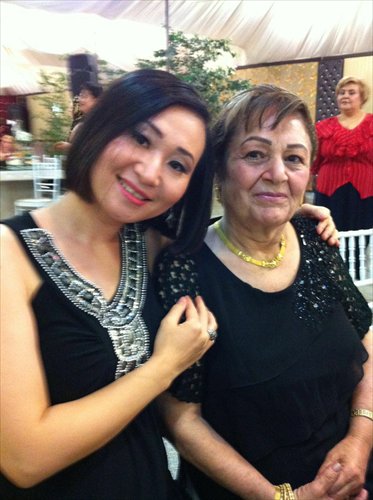Chinese women in intercultural marriages discuss the ups and downs of dealing with their husbands’ moms

Some say that foreign mothers-in-law are generally less controlling than their Chinese counterparts. Photo: IC
The first time Michelle Min met her mother-in-law at the airport, she was both nervous and curious.
Although her new husband, Stelios, had already explained the bisous culture in Greece (the custom of kissing others on the cheek in greeting), Min was still nervous about it, and indeed remembers that their meeting was somewhat awkward.
After that initial bump, though, Min quickly warmed up to her mother-in-law. "She is very warm-hearted," Min said. "We treat each other with the same respect you'd treat a guest." Min, 32, a fashion designer, and Stelios, an investment consultant from Greece, met in Beijing and have been married for six months.
At first Min was worried about how well she would be able to get along with her mother-in-law, not only because of the famous friction between mothers- and daughters-in-law, but because they came from different cultures.
It's a concern for many women, as intercultural marriages become more common in China. According to the Beijing Municipal Bureau of Civil Affairs, between 2010 and 2014, more than 1,000 international couples registered for marriage in Beijing each year. This means that the city is seeing a growing number of Chinese men and women negotiating sometimes tricky relationships with their foreign in-laws. Metropolitan talked to several Chinese women who share what it is like having a foreign mother-in-law and how they've managed to maintain good relationships with them.

Chinese women in intercultural marriages need to overcome distance and different expectations to form good relationships with their foreign mothers-in-law. Photo: IC
Understanding one another
Min speaks highly of her mother-in-law, a retiree of the financial industry, and said she admires her ability to keep her house organized and do everything from doing the laundry to preparing beautiful meals.
"But I could never be that good," she said. "She must think that we are living under horrible conditions in Beijing."
They visit Greece twice a year for a few weeks each time.
One of the first things that Min noticed about her mother-in-law was how much care she took with her appearance, something that stands in stark contrast to many middle-aged women in China, who largely let their vanity fall by the wayside in order to devote more time to their children and grandchildren.
"I think that's great," she said.
However, after the initial excitement of meeting each other, minor misunderstandings began to arise from both the language barrier and differing cultures and customs.
For example, Min said when they visit, she always starts out eating with everybody, but as the days go by, she begins to miss Chinese food so much that she'll often cook for herself and eat separately. Another reason for this is that in Greece, families often eat dinner much later than in China.
"I think my mother-in-law might not like this," she said. "It's just like here, when you don't eat much food, Chinese parents are not happy."
And then there are the differences in their personalities.
One example is when Min's mother-in-law complained of an aching back, but refused Min's offer to give her a massage, preferring to take medicine instead, which Min couldn't understand. Another example is that her mother-in-law likes to plan everything out ahead of time, while Min prefers to be more spontaneous.
But Min tries to be understanding. "Maybe it's because the transportation is not as convenient as in Beijing, so they have to coordinate to drive someplace," she said. "Or maybe they think it's rude to have loose plans when they have guests."

Anne Zhao and her mother-in-law Photo: Courtesy of Anne Zhao
The beauty of distance
Thankfully, since so many Chinese-foreign couples live in China, run-ins with in-laws need only happen a couple times a year, if that.
"Distance is a good thing," said Min, who added that if they ever had to live together, there would likely be problems. "A woman is often the center of a family. When I am also there, I think she will feel less comfortable. Whether you're in China or not, the relationship between two women is delicate."
Still, there are advantages to having a foreign mother-in-law.
Anne Zhao, a secretary who works for an international corporation in Beijing, and her husband Kamy, who comes from Iran, married in 2012 and now have a 2-year-old daughter.
The first time Zhao met her mother-in-law was when she and her husband visited Tehran for the first time as a couple. They arrived in the middle of the night, but the whole family was up waiting for them to give her a proper welcome into the family.
Zhao likes her mother-in-law for respecting her and her husband's choices and space - much more so, she said, than her own mother does. Zhao's mother interferes more, especially when it comes to raising the baby. She often gives the couple instructions on what not to feed the baby, what to do when she's ill, and even advises them not to use diapers because she thinks they can cause bowlegs.
Zhao's mother-in-law, by contrast, is less fixated on her grandchildren than many Chinese grandparents. "She understands that my husband, the baby and I are a small family group. She'll take care of the kids, but she doesn't give instructions when it comes to education, and she never corrects the children's behavior."
According to Zhao, the subject of education is among the greatest sources of dispute between couples and their in-laws in China, and the same holds true for her own mother.
Zhao said compared to China, foreign families often respect their children more and allow them to be more independent. "They understand that their children have different roles in different stages of their lives, and know how much parents can participate in their lives at these stages," she said. "However, Chinese parents think their children should never disobey their wishes."
Based on her own experience and that of friends who married foreigners, Zhao thinks it's more common for the foreign partners to have conflicts with their Chinese in-laws than the other way around.
"After all, Chinese parents like to control, which can be a major cause of conflict."
The husband's role
Still, Zhao and her mother-in-law occasionally have differing opinions on household matters, even though they don't talk much due to the language barrier. For example, her mother-in-law believes that people should save their money in the bank, while Zhao is more interested in investing.
Both Zhao and her mother-in-law have mild tempers, which means they rarely have any major conflicts, but she thinks it's her husband who contributes the most to their harmonious relationship. "Even if you can't communicate due to language barriers, you shouldn't worry about it. That's when your partner comes in and acts as a bridge."
According to Stelios, however, husbands should avoid getting too involved. "I don't feel I need to get involved too much. Mostly just for translation reasons."
Xu Huairou, a 29-year-old Taiwanese who moved to Beijing in 2013, is on good terms with her American mother-in-law. Xu feels quite fortunate compared to some of her friends, whose mothers-in-law come from traditional Chinese families and have a lot of rules, or even compared to her own mother, who she sometimes feels can be a bit smothering.
Xu thinks that Chinese wives should not rely on their husbands for communication with their mothers-in-law. "He can introduce you, but you should be the one who does the talking and expresses yourself."
The most important thing is respect, she said, and respect comes from knowing each other as independent people.
Coping with different expectations
Based on her experience working with intercultural couples, Christine Forte, a mental health counselor at Balanced Heart Counseling in Shanghai, told Metropolitan that distance tends to give people more time and space to work things out. But she added that it also means when they do spend time together, such as during a two-week visit back home, it can be more intense.
"There can already be a delay, if the daughter-in-law and mother-in-law are from different cultures, in building a relationship, and then the physical distance makes it harder."
Different expectations are one source of conflict, said Forte, and can range from small things like eating habits, to bigger things like how involved distant grandparents should be in their grandchildren's lives.
As for Chinese spouses, while many enjoy the fact that they receive less pressure from their in-laws, they are sometimes disappointed by what they perceive as "their [lower] level of involvement," Forte said. "I've seen it happen. It might be a sense of 'my parents do so much but my in-laws do nothing.'"
She encourages Chinese wives to give their mothers-in-law the benefit of the doubt. "Maybe they have done something or said something that seems insulting, but maybe before taking it personally, try to understand where that person is coming from before jumping to the conclusion that they don't want you in the family."
As for foreign husbands, Forte suggests that they first evaluate the delicacy of the situation, since a husband's meddling can be perceived by his wife as siding with his mother, even though he is merely trying to explain the cultural differences. "Try to empathize, while also sharing other ways of seeing the situation."
Finally, she said, husbands and wives should always remember who comes first. "I encourage partners to prioritize each other; parents should come after what the couple wants."
Newspaper headline: Meet the mother